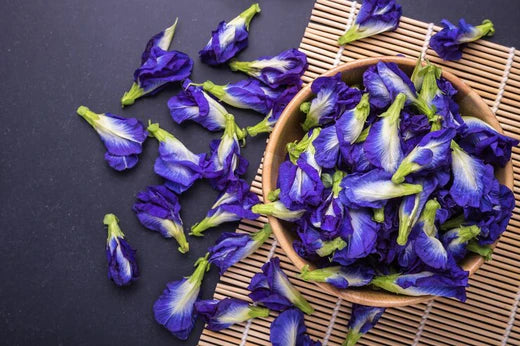The Aparajita plant is a very lovely herbaceous plant with various medical benefits, and it is another extremely helpful herb described in Ayurvedic texts.
It significantly calms the body's neurological, circulatory, and psychological systems.
Aparajita is often referred to as Koyala in Hindi. "Clitoria ternatea" is the Latin name of the plant, which is a member of the Fabaceae family.
Synonyms of Shankupushpam
- English name - Mezereon, Butterfly pea, Clitoria, Winged – leaved
- Hindi name - Koyala
- Sanskrit name - Girikarnika, Vishnukranta, Yonipushpa, Kokilaa
- Tamil Name - Kakkanam
- Telugu Name - Dintena, Sankupushpam
- Unani Name - Mezereon
- Bengali Name - Aprajita
- Gujrati Name - Garnee
- Malayalam Name - Shankhapushpam
- Marathi Name - Gokarni
Occurrence
The aparajita plant, also known as simply "aparajita," is a twiner that climbs on other plants and is herbaceous. It features vibrant green foliage and occasionally white, blue, or lilac blooms.
Given its look, it is also sometimes called a conch shell. The plant is widely distributed throughout India, Egypt, Afghanistan, Persia, Mesopotamia, and Iraq, for example.
The plant's entire body is used for medical purposes, both inside and externally.
Properties
|
|
Hindi / Sanskrit |
English |
|
Rasa (Taste) |
Tikta, Katu, Kashaya |
Bitter, Pungent, Astringent |
|
Guna (Characteristics) |
Laghu, Ruksha |
Light, Dry |
|
Virya (Potency) |
Sheeta |
Cold |
|
Vipaka (Post-Digestive Taste) |
Katu |
Pungent |
Special Activity
Aparajita planet is frequently utilized in Ayurvedic Panchakarma therapies. These therapies work wonders to balance the body's doshas and promote both internal and exterior detoxification.
It is utilized to treat a variety of bodily diseases caused by vata vitiation because of its effects on the neurological system.
Common properties
- Ayurveda identifies aparajita as an herb belonging to the Medhya family. Memory and learning are aided by "Medhya" herbs. As a result, it is quite helpful for children who have problems with cognitive impairment and brain development.
- It is a member of the Ayurvedic "Shirovirechanopaga" plant family. This suggests that it helps with the brain and its supporting structures' overall purging and detoxification.
- It also helps with throat issues and voice quality.
- The root of this plant is often applied topically to the skin, where it soothes the eyes and aids in better vision.
- Aparajita extracts are good for treating any type of inflammatory illness in the body due to their natural anti-inflammatory properties. It relieves indigestion and aids in the malabsorption of food in the intestines.
- Some of the frequent symptoms that Aparajita can help with include fever, diarrhea, gastritis, nausea, vomiting, and bleeding from the anus.
- Aparajita is frequently used in the Ayurvedic treatment of neurological illnesses, mania, and schizophrenia, among other conditions.
- It also supports the respiratory and cardiovascular systems.
- This herb helps in the process of spermatogenesis in men, making it a great choice for those struggling with infertility and impotence.
- It functions as a healthy natural blood tonic. The rasa mixture aids in blood purification and the treatment of several skin conditions, including boils, skin eruptions, acne, and pimples.
- Aparajita can be used externally to treat boils in conditions like smallpox and be highly effective.
Dosage
According to the situation, different mixes of root, bark, and seeds are used.

